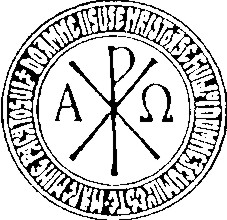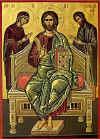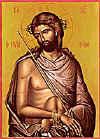|
|
All Saints Church |
|
|||||||||||||||||||||||||||||||||||||||||||||||||||||||||||||||||||||||||||||||||||||||||||||||||||||||||||||||||||||||||||||||||||||||||||||||||||||||||||||||||||||||||||||||||||||||||||||||||||||||||||||||||||||||||||||||||||||||||||||||||||||||||||||||||||||||||||||||||||||||||||||||||||||||||||||||||||||||||||||||||||||||||||||||||
|
|
PASCHAL CALENDAR
|
PASCHALIA About determinating the date of Easter
The determination of the date of Easter is
governed by a computation based on the vernal equinox and the phase of the
moon. According to the ruling of the First Ecumenical Synod in 325, Easter
Sunday should fall on the Sunday which follows the first full moon after the
vernal equinox. If the full moon happens to fall on a Sunday, Easter is
observed the following Sunday. The day taken to be the invariable date of the
vernal equinox is March 21.
The difference in the determination of Easter between the
Orthodox and other Christian Churches concerns the date of Passover. Jews
originally celebrated Passover on the first full moon following the vernal
equinox. Christians, therefore, celebrated Easter on the first Sunday after
the first full moon following the vernal equinox. After the destruction of
Jerusalem in 70 A.D. and the other tragic events, which gave rise to the
dispersal of the Jews, Passover sometimes preceded the vernal equinox. This
was occasioned by the dependence of the dispersed Jews upon local pagan
calendars for the calculation of Passover. As a consequence, most Christians
eventually ceased to regulate the observance of Easter by the Jewish
Passover. Their purpose, of course, was to preserve the original practice of
celebrating Easter following the vernal equinox. As an alternative to calculating Easter by the Passover,
"paschal (Easter) cycles" were devised. The Orthodox Church eventually
adopted a 19-year cycle, the Western Church an 84-year cycle. The use of two
different "paschal cycles" inevitably gave way to differences between the
Eastern and Western Churches regarding the observance of Easter. Varying
dates for the vernal equinox increased these differences. Consequently, it is
the combination of these variables, which accounts for the different date of
Orthodox Easter, whenever it varies from the rest of Christendom. |
|||||||||||||||||||||||||||||||||||||||||||||||||||||||||||||||||||||||||||||||||||||||||||||||||||||||||||||||||||||||||||||||||||||||||||||||||||||||||||||||||||||||||||||||||||||||||||||||||||||||||||||||||||||||||||||||||||||||||||||||||||||||||||||||||||||||||||||||||||||||||||||||||||||||||||||||||||||||||||||||||||||||||||||||||


![[image]](images/newban_sm.gif)









